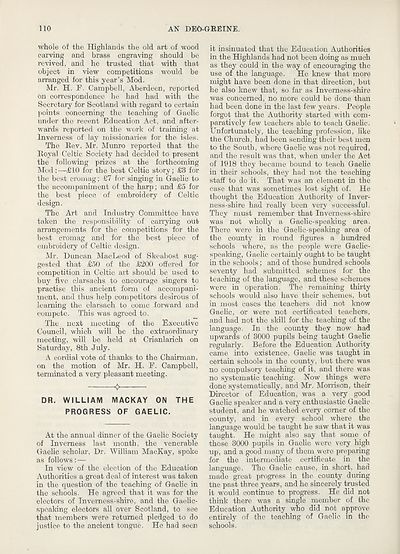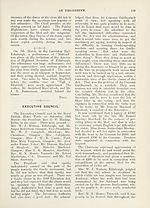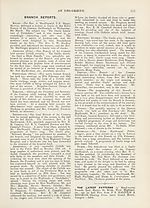An Comunn Gàidhealach Publications > Deo-gréine > Volume 17, October 1921 to September 1922
(118) Page 110
Download files
Complete book:
Individual page:
Thumbnail gallery: Grid view | List view

110
AN DEO-GREINE.
whole of the Highlands the old art of wood
carving and brass engraving should be
revived, and he trusted that with that
object in view competitions would be
arranged for this year’s Mod.
Mr. H. F. Campbell, Aberdeen, reported
on correspondence he had had with the
Secretary for Scotland with regard to certain
points concerning the teaching of Gaelic
under the recent Education Act, and after¬
wards reported on the work of training at
Inverness of lay missionaries for the isles.
The Rev. Mr. Munro reported that the
Royal Celtic Society had decided to present
the following prizes at the forthcoming
Mod :—£10 for the best Celtic story; £3 for
the best cromag; £7 for singing in Gaelic to
the accompaniment of the harp; and £5 for
the best piece of embroidery of Celtic
design.
The Art and Industry Committee have
taken the responsibility of carrying out
arrangements for the competitions for the
best cromag and for the best piece of
embroidery of Celtic design.
Mr. Duncan MacLeod of Skeabost sug¬
gested that £50 of the £200 offered for
competition in Celtic art should be used to
buy five clarsachs to encourage singers to
practise this ancient form of accompani¬
ment, and thus help competitors desirous of
learning the clarsach to come forward and
compete. This was agreed to.
The next meeting of the Executive
Council, which will be the extraordinary
meeting, will be held at Crianlarich on
Saturday, 8th July.
A cordial vote of thanks to the Chairman,
on the motion of Mr. H. F. Campbell,
terminated a very pleasant meeting.
<>
DR. WILLIAM MACKAY ON THE
PROGRESS OF GAELIC.
At the annual dinner of the Gaelic Society
of Inverness last month, the venerable
Gaelic scholar, Dr. William MacKay, spoke
as follows: —
In view of the election of the Education
Authorities a great deal of interest was taken
in the question of the teaching of Gaelic in
the schools. He agreed that it was for the
electors of Invemess-shire, and the Gaelic-
speaking electors all over Scotland, to see
that members were returned pledged to do
justice to the ancient tongue. He had seen
it insinuated that the Education Authorities
in the Highlands had not been doing as much
as they could in the way of encouraging the
use of the language. He knew that more
might have been done in that direction, but
he also knew that, so far as Inverness-shire
was concerned, no more could be done than
had been done in the last few years. People
forgot that the Authority started with com¬
paratively few teachers able to teach Gaelic.
Unfortunately, the teaching profession, like
the Church, had been sending their best men
to the South, where Gaelic was not required,
and the result was that, when under the Act
of 1918 they became bound to teach Gaelic
in their schools, they had not the teaching
staff to do it. That was an element in the
case that was sometimes lost sight of. He
thought the Education Authority of Inver¬
ness-shire had really been very successful.
They must remember that Inverness-shire
was not wholly a Gaelic-speaking area.
There were in the Gaelic-speaking area of
the county in round figures a hundred
schools where, as the people were Gaelic¬
speaking, Gaelic certainly ought to be taught
in the schools; and of those hundred schools
seventy had submitted schemes for the
teaching of the language, and these schemes
were in operation. The remaining thirty
schools would also have their schemes, but
in most cases the teachers did not know
Gaelic, or were not certificated teachers,
and had not the skill for the teaching of the
language. In the county they now had
upwards of 3000 pupils being taught Gaelic
regularly. Before the Education Authority
came into existence, Gaelic was taught in
certain schools in the county, but there was
no compulsory teaching of it, and there was
no systematic teaching. Now things were
done systematically, and Mr. Morrison, their
Director of Education, was a very good
Gaelic speaker and a very enthusiastic Gaelic
student, and he watched every corner of the
county, and in every school where the
language would, be taught he saw that it was
taught. He might also say that some of
those 3000 pupils in Gaelic were very high
up, and a good many of them were preparing
for the intermediate certificate in the
language. The Gaelic cause, in short, had
made great progress in the county during
tne past three years, and he sincerely trusted
it would continue to progress. He did not
think there was a single member of the
Education Authority who did not approve
entirely of the teaching of Gaelic in the
schools.
AN DEO-GREINE.
whole of the Highlands the old art of wood
carving and brass engraving should be
revived, and he trusted that with that
object in view competitions would be
arranged for this year’s Mod.
Mr. H. F. Campbell, Aberdeen, reported
on correspondence he had had with the
Secretary for Scotland with regard to certain
points concerning the teaching of Gaelic
under the recent Education Act, and after¬
wards reported on the work of training at
Inverness of lay missionaries for the isles.
The Rev. Mr. Munro reported that the
Royal Celtic Society had decided to present
the following prizes at the forthcoming
Mod :—£10 for the best Celtic story; £3 for
the best cromag; £7 for singing in Gaelic to
the accompaniment of the harp; and £5 for
the best piece of embroidery of Celtic
design.
The Art and Industry Committee have
taken the responsibility of carrying out
arrangements for the competitions for the
best cromag and for the best piece of
embroidery of Celtic design.
Mr. Duncan MacLeod of Skeabost sug¬
gested that £50 of the £200 offered for
competition in Celtic art should be used to
buy five clarsachs to encourage singers to
practise this ancient form of accompani¬
ment, and thus help competitors desirous of
learning the clarsach to come forward and
compete. This was agreed to.
The next meeting of the Executive
Council, which will be the extraordinary
meeting, will be held at Crianlarich on
Saturday, 8th July.
A cordial vote of thanks to the Chairman,
on the motion of Mr. H. F. Campbell,
terminated a very pleasant meeting.
<>
DR. WILLIAM MACKAY ON THE
PROGRESS OF GAELIC.
At the annual dinner of the Gaelic Society
of Inverness last month, the venerable
Gaelic scholar, Dr. William MacKay, spoke
as follows: —
In view of the election of the Education
Authorities a great deal of interest was taken
in the question of the teaching of Gaelic in
the schools. He agreed that it was for the
electors of Invemess-shire, and the Gaelic-
speaking electors all over Scotland, to see
that members were returned pledged to do
justice to the ancient tongue. He had seen
it insinuated that the Education Authorities
in the Highlands had not been doing as much
as they could in the way of encouraging the
use of the language. He knew that more
might have been done in that direction, but
he also knew that, so far as Inverness-shire
was concerned, no more could be done than
had been done in the last few years. People
forgot that the Authority started with com¬
paratively few teachers able to teach Gaelic.
Unfortunately, the teaching profession, like
the Church, had been sending their best men
to the South, where Gaelic was not required,
and the result was that, when under the Act
of 1918 they became bound to teach Gaelic
in their schools, they had not the teaching
staff to do it. That was an element in the
case that was sometimes lost sight of. He
thought the Education Authority of Inver¬
ness-shire had really been very successful.
They must remember that Inverness-shire
was not wholly a Gaelic-speaking area.
There were in the Gaelic-speaking area of
the county in round figures a hundred
schools where, as the people were Gaelic¬
speaking, Gaelic certainly ought to be taught
in the schools; and of those hundred schools
seventy had submitted schemes for the
teaching of the language, and these schemes
were in operation. The remaining thirty
schools would also have their schemes, but
in most cases the teachers did not know
Gaelic, or were not certificated teachers,
and had not the skill for the teaching of the
language. In the county they now had
upwards of 3000 pupils being taught Gaelic
regularly. Before the Education Authority
came into existence, Gaelic was taught in
certain schools in the county, but there was
no compulsory teaching of it, and there was
no systematic teaching. Now things were
done systematically, and Mr. Morrison, their
Director of Education, was a very good
Gaelic speaker and a very enthusiastic Gaelic
student, and he watched every corner of the
county, and in every school where the
language would, be taught he saw that it was
taught. He might also say that some of
those 3000 pupils in Gaelic were very high
up, and a good many of them were preparing
for the intermediate certificate in the
language. The Gaelic cause, in short, had
made great progress in the county during
tne past three years, and he sincerely trusted
it would continue to progress. He did not
think there was a single member of the
Education Authority who did not approve
entirely of the teaching of Gaelic in the
schools.
Set display mode to:
![]() Universal Viewer |
Universal Viewer | ![]() Mirador |
Large image | Transcription
Mirador |
Large image | Transcription
| An Comunn Gàidhealach > An Comunn Gàidhealach Publications > Deo-gréine > Volume 17, October 1921 to September 1922 > (118) Page 110 |
|---|
| Permanent URL | https://digital.nls.uk/127171389 |
|---|
| Description | Leabhar 17, Treasamh Mios an Fhoghair 1921 gu Dara Mìos an Fhoghair 1922 |
|---|---|
| Attribution and copyright: |
|
| Description | This contains items published by An Comunn, which are not specifically Mòd-related. It includes journals, annual reports and corporate documents, policy statements, educational resources and published plays and literature. It is arranged alphabetically by title. |
|---|
| Description | A collection of over 400 items published by An Comunn Gàidhealach, the organisation which promotes Gaelic language and culture and organises the Royal National Mòd. Dating from 1891 up to the present day, the collection includes journals and newspapers, annual reports, educational materials, national Mòd programmes, published Mòd literature and music. |
|---|---|
| Additional NLS resources: |
|

